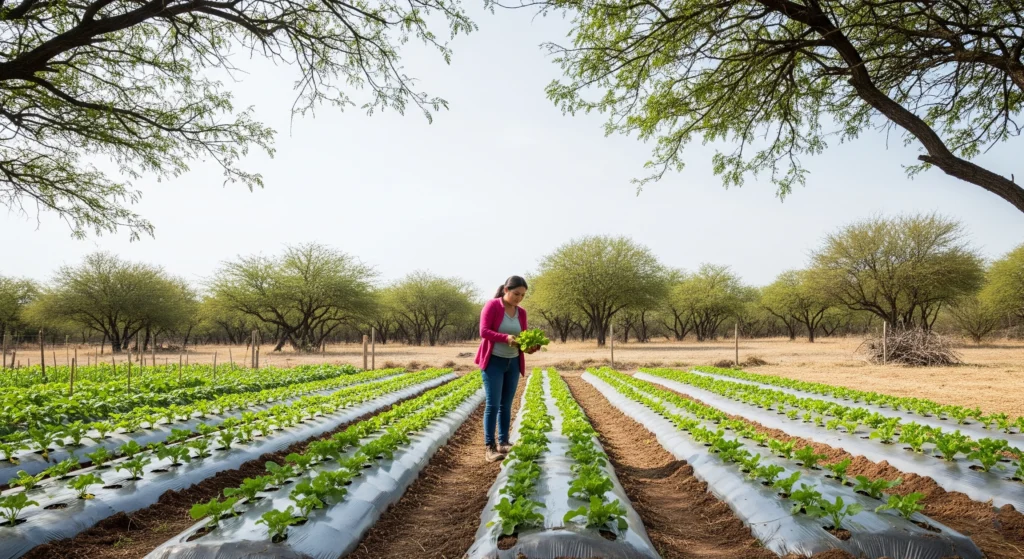Water scarcity is one of the most pressing issues for Indian farmers, especially in drought-prone areas. With inconsistent monsoons and rapidly depleting groundwater, conserving water is no longer optional—it’s essential.
One solution gaining traction is the use of mulch films. These simple yet powerful tools can help farmers reduce water usage by up to 40%, while also improving soil health and crop yield.
In this article, you will discover how mulch films work, their benefits, and why farmers across India are adopting them rapidly. If you’re looking to farm more efficiently in dry regions, this guide will provide you with clear, actionable insights.
What is Mulching Film and How Does it Work?
Understanding Mulch Film
Mulch film is a thin plastic layer spread over soil to cover it, usually during the planting of crops. It acts as a protective barrier, helping retain moisture, regulate soil temperature, and prevent weed growth.
There are different types of mulching films available, including:
- Black mulch film
- Silver-black mulch film
- Transparent mulch film
- Biodegradable mulch film
Each type offers unique benefits depending on the climate and crop.
How Mulch Films Reduce Water Usage
Mulching films prevent the evaporation of water from the soil by:
- Creating a barrier against sun exposure
- Minimizing direct contact of wind with the soil
- Enhancing the soil’s ability to retain moisture
By reducing surface evaporation, mulch films help maintain a consistent level of moisture near plant roots, which significantly cuts down irrigation needs.
Key Benefits of Using Mulching Film in Drought-Prone Areas
1. Water Conservation
- Retains up to 40% more soil moisture
- Reduces irrigation frequency
- Prevents water wastage through runoff
2. Better Crop Health
- Minimizes water stress on plants
- Promotes stronger root systems
- Reduces the risk of soil-borne diseases
3. Weed Suppression
- Blocks sunlight, preventing weed germination
- Less competition for water and nutrients
4. Enhanced Soil Structure
- Reduces soil compaction
- Maintains soil aeration
- Promotes microbial activity
5. Improved Yield and Quality
- Creates a stable microclimate
- Supports uniform crop growth
- Enhances the visual quality of produce
Ideal Crops for Mulching Film Application
Mulching films can be used for a wide range of crops. Common examples include:
- Vegetables: Tomato, capsicum, cucumber, brinjal
- Fruits: Strawberry, watermelon, muskmelon
- Flowers: Marigold, rose
These crops benefit immensely from the consistent moisture and weed-free environment mulch films create.
Real-World Application in Indian Agriculture
Farmers across India, especially in states like Maharashtra, Madhya Pradesh, Rajasthan, and Tamil Nadu, are adopting mulch films.
Success Story: Madhya Pradesh Farmer
A farmer in Indore switched to black mulch film for his tomato crop. Over one season, he observed:
- 35% reduction in water usage
- Healthier plant growth
- Increase in yield by 20%
This shows that even without changing irrigation methods, mulching alone can lead to significant water savings.
Choosing the Right Mulching Film in Indore
If you are looking for a mulching film in Indore, consider factors like:
- Type of crop
- Duration of the crop cycle
- Local weather conditions
- Soil type
You can contact leading mulching film manufacturer in Indore for expert guidance. Many agricultural mulch film suppliers in Indore provide different sizes, thicknesses, and materials suited for your needs.
Also, if you’re interested in mulching paper in Indore, it’s a good eco-friendly option for short-cycle crops.
How to Use Mulch Films Effectively
Follow these steps for best results:
- Prepare the land: Ensure the soil is level and free from debris.
- Irrigate: Wet the soil before laying the mulch film.
- Lay the mulch film: Spread it tightly over the soil.
- Plant through holes: Make holes in the film and plant the saplings.
Avoid covering too early or too late in the season. Timing plays a crucial role in maximizing water savings.
Frequently Asked Questions (FAQs)
1. How much water can mulch films actually save?
Mulch films can reduce water evaporation by up to 40%, depending on weather and soil conditions.
2. Are mulch films suitable for all soil types?
Yes, they work well in sandy, loamy, and even clay soils. Just ensure proper installation for maximum benefit.
3. Can I reuse mulch films for multiple crop cycles?
It depends on the material. Some heavy-duty films can be reused, but biodegradable ones are for single use only.
Conclusion
Mulch films are a game-changer for Indian farmers battling drought and water scarcity. By preserving soil moisture, controlling weeds, and supporting healthier crops, these films are helping to revolutionize agriculture in water-stressed regions.
If you’re looking to make a long-term investment in your farm’s sustainability, mulch films are the way to go.






